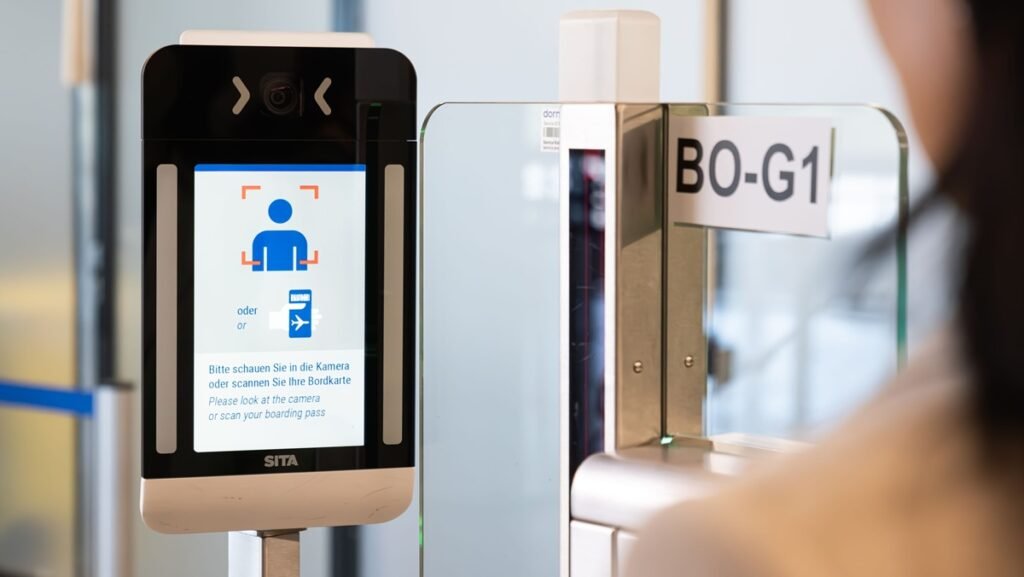UAE airports are leading the way in airport innovation. With the use of facial recognition and artificial intelligence (AI), airports across the country have reduced the time it takes for passengers to go from check-in to departure to just 12 minutes.
This high-tech update is not only saving time but also creating a smoother and more stress-free travel experience for millions of passengers.
What is facial recognition and how does it help?
Facial recognition technology uses cameras to scan a person’s face and match it to their passport photo and travel records. This allows travelers to move through the airport without showing documents at every step.

In UAE airports, this tech now replaces traditional boarding passes and ID checks. All passengers need to do is look at a camera. The system confirms their identity in seconds and lets them pass through check-in, immigration, and boarding quickly.
AI working behind the scenes
Artificial intelligence helps make this process even faster and smarter. AI systems analyze data, predict travel flows, and prevent delays. The system creates a digital profile for each traveler, which helps airports track passenger movement in real time while improving safety and reducing the chance of mistakes.

New terminal leads the change

The changes began when one of the UAE’s newest airport terminals started using a Smart Travel system. Since opening, it has processed more than a million passengers using facial recognition. Travelers can now move through the entire airport—from check-in to passport control to boarding—in just 12 minutes.
This Smart Travel system works by creating a digital face print. Once a traveler’s face is scanned at check-in, they don’t need to stop again. They simply walk through each stage of the airport, with their face acting as their boarding pass.
Benefits of using facial recognition and AI at airports
Here’s why travelers and airport staff are excited about this change:
- Faster processing: No more long lines at check-in or security.
- Better accuracy: Less chance of human error or identity fraud.
- More comfort: Travelers don’t need to constantly show their passport or ticket.
- Increased safety: AI helps detect unusual behavior or problems before they happen.
- Smarter staffing: Airport staff can focus on other tasks while AI handles document checks.
What’s coming next?
By 2025, all UAE airports plan to fully adopt these technologies across check-in counters, security, boarding gates, and even shops inside the terminal. The system will also connect with duty-free and retail services, making travel more seamless than ever before.
The goal is to reduce traveler processing time even further—from 25 seconds per passenger to just 7 seconds.
Authorities also plan to include automatic ticket verification in the process. This means travelers will no longer need to show a paper or mobile boarding pass at all.
A new global benchmark
UAE airports are now among the fastest and most efficient in the world. Travelers from all over are praising the country for setting a new standard in airport service.
Other countries are watching closely. Many are expected to follow UAE’s example and invest in similar facial recognition and AI technologies for their own airports.
How does it feel for passengers?
Many travelers say the experience feels futuristic and easy. From the moment they enter the airport to the time they board their flight, there are no papers to show and no queues to wait in. They simply walk through the airport, and everything works automatically.
This new way of traveling is not only quicker but also less stressful, especially for families, elderly passengers, and business travelers in a hurry.
What about privacy and safety?

UAE authorities have put strong systems in place to protect personal data. The facial recognition system stores information securely and only for the time needed for travel. After that, the data is deleted or stored under strict rules.
At the same time, the technology adds an extra layer of safety by quickly spotting fake documents or suspicious behavior.
The future of air travel is here
The use of facial recognition and AI at UAE airports shows how technology can make everyday tasks easier and faster. With only a 12-minute journey from check-in to departure, the UAE has created a future-forward model that blends comfort, speed, and security.
This is just the beginning. As these systems improve and expand, air travel could become even more efficient in the coming years—not just in the UAE, but all around the world.
Read More: Flynas Resumes Riyadh to Damascus Flights After Long Break












